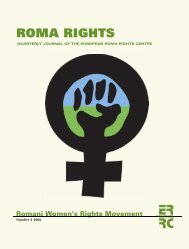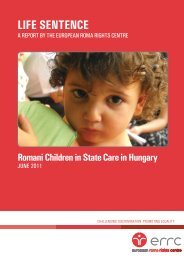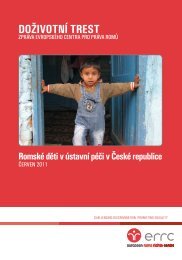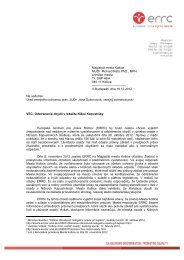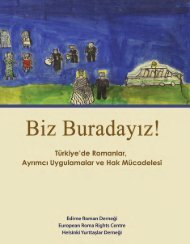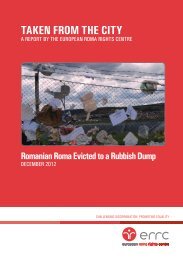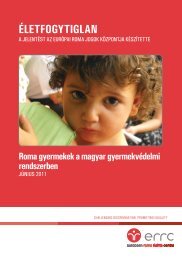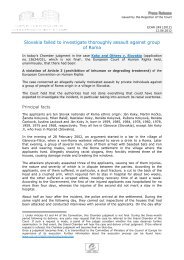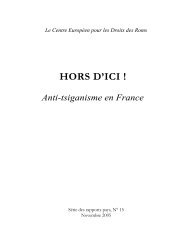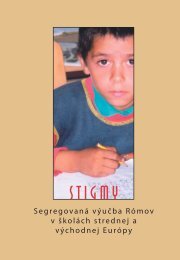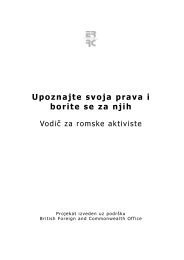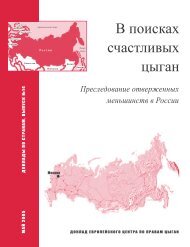security a la italiana sicurezza all'italiana securitate a la italiana
security a la italiana sicurezza all'italiana securitate a la italiana
security a la italiana sicurezza all'italiana securitate a la italiana
Create successful ePaper yourself
Turn your PDF publications into a flip-book with our unique Google optimized e-Paper software.
4. ABUSE AND ILL-TREATMENT BY STATE ACTORS<br />
Human rights documentation conducted by the Coalition in Romani camps in Italy between<br />
23 and 30 May 2008 confirmed the continuation of constant abuse and ill-treatment of Roma<br />
by state actors in Italy since the <strong>la</strong>st major report on this situation published in February<br />
2008. 27 e Coalition conducted interviews with approximately 100 Romani individuals<br />
living in formal and informal Romani camps in Naples (Secondiliano, Centro Lima, Scampia,<br />
Ponticelli, Santa Maria and Torre Annunziata Nord), Rome (Salviati, River, Casilino 900,<br />
Martora, Cave di Piatra<strong>la</strong>ta, and an un-named camp close to Cave di Piatra<strong>la</strong>ta), Mi<strong>la</strong>n (Via<br />
Tribugnano, Corsico settlement and the Bacu<strong>la</strong> settlement) and Brescia (Nomad Camp of<br />
Brescia for Sinti Italians) and Torino (Via Germagnano and Lungo Stura Lazio). e forms<br />
of abuse reported to the Coalition included physical violence and beatings by police agents,<br />
verbal harassment, arbitrary data-basing, fingerprinting and surveil<strong>la</strong>nce.<br />
Physical Violence by Police Officers<br />
e actions perpetrated against Roma at the hands of Italian authorities vio<strong>la</strong>te a number<br />
of Italy’s obligations under international human rights <strong>la</strong>w. Specifically, as a Party to the<br />
European Convention for Human Rights (ECHR), the Italian government is required, per<br />
Article 3, to ensure that “No one shall be subjected to torture or to inhuman or degrading<br />
treatment or punishment.”<br />
Many of the Romani individual interviewed during the course of documentation reported<br />
an increased level of police violence and abuse, particu<strong>la</strong>rly following the November 2007<br />
death of Ms Giovana Grenga, an Italian woman, for which Italy media initially and without<br />
evidence accused a Romani man. Romani individuals who engaged in informal economic<br />
activities, such as washing car windshields at traffic lights or begging, reported being targeted<br />
by police for violence and abuse in recent months.<br />
One Romanian Romani man who had been living in Italy for 3 years with whom the<br />
Coalition spoke reported that police officers had severely beaten him the night before. e<br />
interviewee stated,<br />
“Last night I was begging in a district in the outskirts of Rome. Police came and took<br />
me to the police station. I showed them my Romanian passport, but they c<strong>la</strong>imed<br />
that my passport is a fake and that I should be from Morocco. ey took my money<br />
and told me not to go back there again to beg. en they started beating me, they<br />
kicked me and s<strong>la</strong>pped me. e beating went on for 15-20 minutes.” 28<br />
27 See ERRC/COHRE/osservAzione/Sucar Drom. February 2008. Written Comments of the European Roma<br />
Rights Centre, the Centre on Housing Rights and Evictions, osservAzione and Sucar Drom Concerning Italy<br />
for Consideration by the United Nations Committee on the Elimination of Racial Discrimination at its 72 nd<br />
Session. Avai<strong>la</strong>ble online at: http://www.errc.org/db/02/9B/m0000029B.pdf.<br />
28 Coalition interview with a Romanian Romani man. Informal Romani camp in Rome, 29 May 2008.<br />
23<br />
SECURITY A LA ITALIANA



